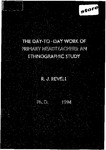THE DAY-TO-DAY WORK OF PRIMARY HEADTEACHERS: AN ETHNOGRAPHIC STUDY
| dc.contributor.author | REVELL, ROGER JAMES | |
| dc.contributor.other | Plymouth Institute of Education | en_US |
| dc.date.accessioned | 2013-10-09T10:12:44Z | |
| dc.date.available | 2013-10-09T10:12:44Z | |
| dc.date.issued | 1994 | |
| dc.identifier | NOT AVAILABLE | en_US |
| dc.identifier.uri | http://hdl.handle.net/10026.1/2107 | |
| dc.description.abstract |
There is a scarcity of empirical data on the nature of primary headteachers' work. Our understanding has to rely heavily on managerial studies or prescriptive commentaries. The study is an ethnographic investigation of my headship and that of other headteachers, using perspectives drawn from symbolic interactionism. Data-collection is by means of open-ended interviews and a one-year journal of my own headship. The findings of the study indicate that the daily work of heads is intense, immediate, pragmatic, discontinuous and unremitting. There are often few opportunities for heads during the day to reflect or make other than short-term plans. Much of heads’ work has a purpose of running the school and often consists of dealing with daily problems. Respondents feel such work is trivial and banal but it is obligatory. There is also another kind of work that is personal to heads, serves idiosyncratic purposes to shape the school, carried out in ways that are independent. The daily work of heads is also characterised by information-processing, decision-making and short-term planning. There are many affective features to headteachers' work, relating to the periodicity of the school year as well as to school-related and personal work. Heads enjoy aspects of their work involving relationships especially the time spent with children. Headteachers' personal work is often occluded by the immediate tasks of running the school. There are several parallels between the study's portrayal of headship and what we already know about teaching. The existence of these similarities indicates that values and norms of teaching may leave a legacy in headship. The study examines a number of implications to arise from these findings. The nature of daily headship is at some variance with government assumption of a responsive line-management. The study considers ways of enhancing the personal, rather than functional aspects of headship, and examines the implications of having separate non-teaching administrators, in addition to head teachers who teach. The study adds to the corpus of ethnographic studies that emphasizes the importance of the person in practitioners' work, viewed in terms of emotions, values and histories. | |
| dc.description.sponsorship | Rolle Faculty of Education | en_US |
| dc.language.iso | en | en_US |
| dc.publisher | University of Plymouth | en_US |
| dc.title | THE DAY-TO-DAY WORK OF PRIMARY HEADTEACHERS: AN ETHNOGRAPHIC STUDY | en_US |
| dc.type | Thesis | |
| plymouth.version | Full version | en_US |
| dc.identifier.doi | http://dx.doi.org/10.24382/1454 | |
| dc.identifier.doi | http://dx.doi.org/10.24382/1454 |
Files in this item
This item appears in the following Collection(s)
-
01 Research Theses Main Collection
Research Theses Main



